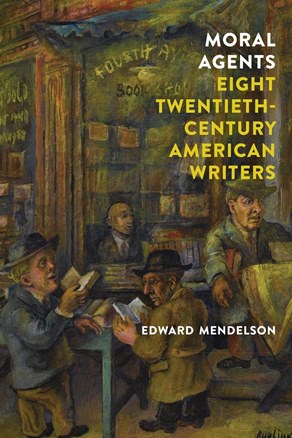Description
A deeply considered and provocative new look at major American writers—including Saul Bellow, Norman Mailer, and W.H. Auden—Edward Mendelson’s Moral Agents is also a work of critical biography in the great tradition of Plutarch, Samuel Johnson, and Emerson. Any important writer, in Mendelson’s view, writes in response to an idea of the good life that is inseparable from the life the writer lives.
Fusing biography and criticism and based on extensive new research, Moral Agents presents challenging new portraits of eight writers—novelists, critics, and poets—who transformed American literature in the turbulent twentieth century. Eight sharply distinctive individuals—inspired, troubled, hugely ambitious—who reimagined what it means to be a writer.
There’s Saul Bellow, a novelist determined to rule as a patriarch, who, having been neglected by his father, in turn neglected his son in favor of young writers who presented themselves as his literary heirs. Norman Mailer’s extraordinary ambition, suppressed insecurity, and renegade metaphysics muddled the novels through which he hoped to change the world, yet these same qualities endowed him with an uncanny sensitivity and deep sympathy to the pathologies of American life that make him an unequaled political reporter. William Maxwell wrote sad tales of small-town life and surrounded himself with a coterie of worshipful admirers. As a powerful editor at The New Yorker, he exercised an enormous and constraining influence on American fiction that is still felt today.
Preeminent among the critics is Lionel Trilling, whose Liberal Imagination made him a celebrity sage of the anxiously tranquilized 1950s, even as his calculated image of Olympian reserve masked a deeply conflicted life and contributed to his ultimately despairing worldview. Dwight Macdonald, by contrast, was a haute-WASP anarchist and aesthete driven by an exuberant moral commitment, in a time of cautious mediocrity, to doing the right thing. Alfred Kazin, from a poor Jewish émigré background, remained an outsider at the center of literary New York, driven both to escape from and do justice to the deepest meanings of his Jewish heritage.
Perhaps most intriguing are the two poets, W.H. Auden and Frank O’Hara. Early in his career, Auden was tempted to don the mantle of the poet as prophet, but after his move from England to America he lived and wrote in a spirit of modesty and charity born out of a deeply idiosyncratic understanding of Christianity. O’Hara, tireless partygoer and pioneering curator at MoMA, wrote much of his poetry for private occasions. Its lasting power has proven to be something different from its avant-garde reputation: personal warmth, individuality, rootedness in ancient traditions, and openness to the world.
About the Author
Edward Mendelson is a professor of English and Comparative Literature and the Lionel Trilling Professor in the Humanities at Columbia University. He is the literary executor of the Estate ofW.H. Audenand the author or editor of several books about Auden's work, including Early Auden (1981) and Later Auden (1999). He is also the author of The Things That Matter: What Seven Classic Novels Have to Say About the Stages of Life (2006), about nineteenth- and twentieth-century novels, and Moral Agents: Eight Twentieth-Century American Writers (2015).He has edited standard editions of works by W. H. Auden, including Collected Poems (1976; 2nd edn. 1990; 3rd edn., 2007), The English Auden (1977), Selected Poems (1979, 2nd edn., 2007), As I Walked Out One Evening (selected light verse, 1995), and the continuing Complete Works of W. H. Auden (1986– ).His work onThomas Pynchonincludes Pynchon: A Collection of Critical Essays (1978) and numerous essays, including "The Sacred, the Profane, and The Crying of Lot 49" (1975; reprinted in the 1978 collection) and "Gravity's Encyclopedia" (in Mindful Pleasures: Essays on Thomas Pynchon). The latter essay introduced the critical category of "encyclopedic narrative," further elaborated in a later essay, "Encyclopedic Narrative from Dante to Pynchon".He is the editor of annotated editions of novels byThomas Hardy,George Meredith,Arnold Bennett,H.G. Wells, andAnthony Trollope. WithMichael Seidelhe co-edited Homer to Brecht; The European Epic and Dramatic Traditions (1977).He was elected to the American Academy of Arts and Sciences in 2015. He was elected a Member of the American Philosophical Society in 2017. He is a Fellow of the Royal Society of Literature, and was the first Isabel Dalhousie Fellow at the Institute for Advanced Studies in the Humanities at the University of Edinburgh.Before teaching at Columbia, he was an associate professor of English at Yale University and a visiting associate professor of English at Harvard University. He received a B.A. from the University of Rochester (1966) and a Ph.D. from the Johns Hopkins University (1969).Since 1986 he has written about computing, software, and typography and is a contributing editor of PC Magazine.He is married to the writerCheryl Mendelson.
